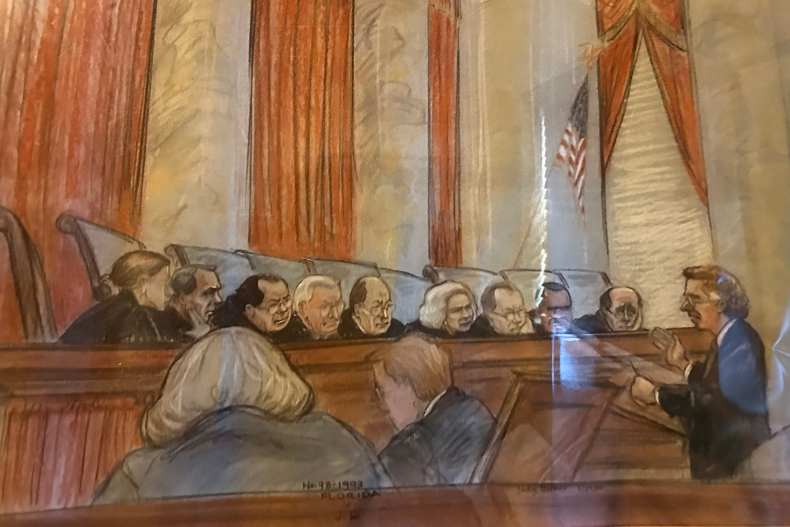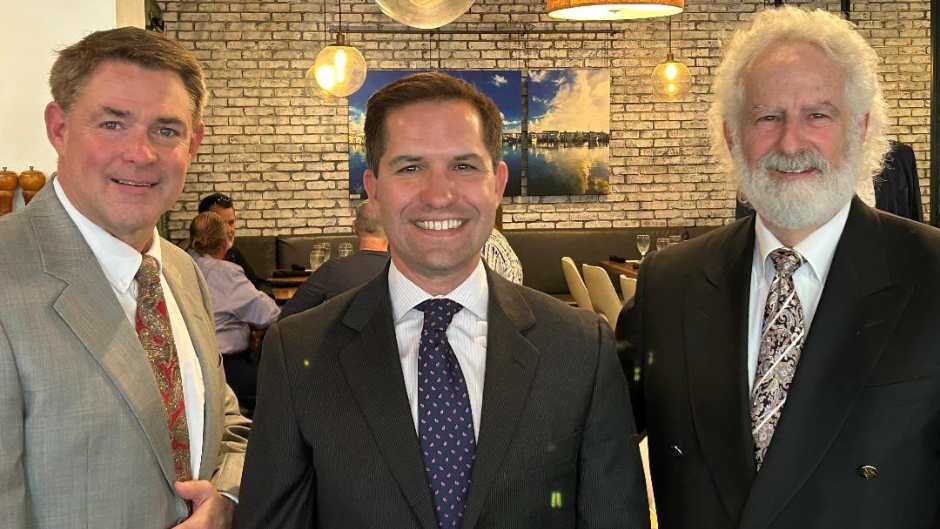Only a few people get to be a fly on the wall as the U.S. Supreme Court hears an essential case on police procedure.
Members of Harvey Sepler's constitutional law course at the Osher Lifelong Learning Institute (OLLI) have gotten a front-row seat to these kinds of historic decisions, as Sepler, J.D. '85, brings his 30+ years of legal experience to their Wednesday afternoon Zoom.
"Fascinating!" noted OLLI member Raquel Robaina after a recent discussion of the landmark civil rights case, Brown vs. Board of Education of Topeka, which found segregation of public schools unconstitutional.
Sepler had invited Harvard law professor and noted civil rights scholar Michael Klarman, who authored a book on the case and its effect on the civil rights movement, to speak to the class.
"It is an excellent class," added Richard Dunn, a retired federal public defender and longtime civil rights advocate. "(Harvey) continues to bring interesting issues and people to the class. I admire (him)."
Sepler, a longtime assistant public defender for Miami-Dade County, has litigated more than 1,500 civil and criminal cases and argued before the U.S. Supreme Court and the Florida Supreme Court, receiving unanimous decisions in his favor several times.
For more than two decades, he has coached a significant number of moot court competition teams and taught the advanced appellate advocacy class at Miami Law.
Thanks to Sepler's dedication as a coach, he was recognized with the first annual Professor M. Minnette Massey Award for his work with the moot court board. He also helped direct the program for a few years, during which Miami Law ranked sixth in the country.
In 2000, Sepler argued before the high court that a police search of a young man in Miami based on an anonymous tip was unconstitutional. The court agreed, and Justice Ruth Bader Ginsburg authored the unanimous decision.

Sepler said it was important for his students to understand how such decisions affect public policy and people's everyday lives.
The case on police "stop and frisk" policies received national media attention and changed police procedures throughout the country.
"The thrust of the class is to gain a better understanding of the protections afforded by the Constitution and how those protections affect not only the operation of our government but the exercise of each of our personal liberties," he explained. "The (Supreme) Court's unanimous decision makes clear that the constitutional protections afforded to all of us prevail in the face of police overreach."
The Zoom format also allows Sepler to bring in high-profile speakers from the legal world that otherwise might not make it to Miami for an OLLI class. Sepler has hosted justices from the Florida Supreme Court, judges from the state’s appellate and trial courts, Miami-Dade’s State Attorney and Public Defender, law school professors from Harvard, Yale, Columbia, and New York University, some of the country’s most respected First Amendment attorneys, a member of Florida’s House of Representatives, a former White House counsel, and a former Solicitor General of the United States, one of the most powerful attorneys in the country.
Sepler, who has taught the course at OLLI for the past six years, said he often receives follow-up emails with questions and comments from his OLLI students.
"The OLLI students are incredibly inquisitive and bright," said Sepler, who was recognized by the Florida Bar in 2011 with one of its most prestigious awards for outstanding service in Florida. "I have an open channel to my students, and I am always amazed at how much they want to learn."
Arnold Levine, a retired partner in one of New York's largest law firms, said Sepler's classes are "among the best I ever attended in college or in law school or elsewhere."
"The discussion about the judges (in Board of Education vs. Topeka) wrestling with their moral judgments ... was intellectually exciting," Levine said. "It made me rethink some of my opinions on the current court, which seems to strongly embrace the idea that advancing moral values should not come at the expense of respecting what the authors of the Constitution intended."
Sepler said that kind of insight is precisely what he hopes to achieve.
"What's important about these classes is that we stimulate thought and ideas about the role of the courts in affecting social policy," he said. "I want them to have a broad understanding of constitutional law and the role of the courts in resolving our most important disputes. (Teaching at OLLI) has been a wonderful experience."
His classes are also among the most popular at OLLI, with many students returning year after year.
"I have taken Constitutional Law with Harvey Sepler since I began at Osher," said Art Young, a retired sales executive. "In these times, even though we don't discuss politics, this course is extremely useful in understanding today's environment."
For more on OLLI, visit miami.edu/olli

